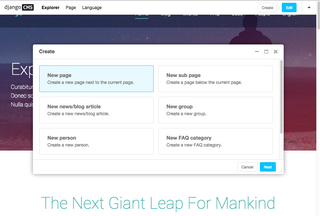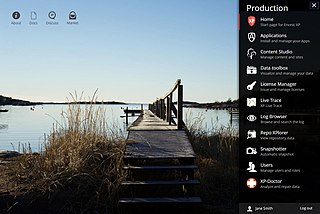
Mantis Bug Tracker is a free and open source, web-based bug tracking system. The most common use of MantisBT is to track software defects. However, MantisBT is often configured by users to serve as a more generic issue tracking system and project management tool.

DNN Platform is a web content management system and web application framework based on the .NET Framework. It is open source and part of the .Net Foundation.

Markdown is a lightweight markup language for creating formatted text using a plain-text editor. John Gruber and Aaron Swartz created Markdown in 2004 as a markup language that is appealing to human readers in its source code form. Markdown is widely used in blogging, instant messaging, online forums, collaborative software, documentation pages, and readme files.
Content Repository API for Java (JCR) is a specification for a Java platform application programming interface (API) to access content repositories in a uniform manner. The content repositories are used in content management systems to keep the content data and also the metadata used in content management systems (CMS) such as versioning metadata. The specification was developed under the Java Community Process as JSR-170, and as JSR-283. The main Java package is javax.jcr.
This is a comparison of notable web frameworks, software used to build and deploy web applications.

Serendipity is a blog and web-based content management system written in PHP and available under a BSD license. It supports PostgreSQL, MySQL, SQLite database backends, the Smarty template engine, and a plugin architecture for user contributed modifications.
The following tables compare general and technical information for a number of available database administration tools. Please see individual product articles for further information. This article is neither all-inclusive nor necessarily up to date.
Spacewalk is open-source systems management software for system provisioning, patching and configuration licensed under the GNU GPLv2.

PrestaShop is a freemium, open source e-commerce platform. The software is published under the Open Software License (OSL). It is written in the PHP programming language with support for the MySQL database management system. It has a software dependency on the Symfony PHP framework.
PivotX is an open-source blog software written in PHP using either flat files or a database to store content. It uses the Smarty web template system and the TinyMCE editor. One installation can handle several blogs, each with its own configuration, including themes. Users belong to different levels regarding managing and editing privileges. New functions can be added via extensions managed through the admin interface.

django CMS is a free and open source content management system platform for publishing content on the World Wide Web and intranets. It is written in Django language framework, with Python.
Pimcore is an open-source enterprise PHP software platform for product information management (PIM), master data management (MDM), customer data management (CDP), digital asset management (DAM), content management (CMS), and digital commerce.

Refinery CMS, often shortened to Refinery, is a free and open-source content management system written in Ruby as a Ruby on Rails web application with jQuery used as the JavaScript library. Refinery CMS supports Rails 3.2 and Rails 4.2 and Rails 5.1.
ProcessWire is a free and open source content management system (CMS), content management framework (CMF) and web application framework (WAF) written in the PHP programming language. It is distributed under the Mozilla Public License 2.0. ProcessWire is built around an API with usage and naming conventions similar to the JavaScript framework jQuery. The stated goal behind the API is to provide the level of accessibility and control to pages in a website that jQuery provides to the DOM. Content is managed either via the API or the web-based admin control panel. ProcessWire is largely used for development of web sites, web applications, services, content feeds and related applications.
HipHop Virtual Machine (HHVM) is an open-source virtual machine based on just-in-time (JIT) compilation that serves as an execution engine for the Hack programming language. By using the principle of JIT compilation, Hack code is first transformed into intermediate HipHop bytecode (HHBC), which is then dynamically translated into x86-64 machine code, optimized, and natively executed. This contrasts with PHP's usual interpreted execution, in which the Zend Engine transforms PHP source code into opcodes that serve as a form of bytecode, and executes the opcodes directly on the Zend Engine's virtual CPU.
Phalcon is a PHP web framework based on the model–view–controller (MVC) pattern. Originally released in 2012, it is an open-source framework licensed under the terms of the BSD License.
Concerto is a web-based digital signage application licensed under the Apache License and written using the Ruby on Rails programming framework. It rotates uploaded graphical, textual, and video content through a template that is accessed by computers running a web browser.

The Pop PHP Framework a free and open source PHP Web framework that was created by Nick Sagona. It is distributed under the BSD License and hosted on GitHub. The framework is intended to be utilized for rapid application development, with an emphasis on web applications.

Enonic XP is a free and open-source web application platform and content management system (CMS) in one based on Java and Elasticsearch. Developed by the Norwegian software company Enonic, the microservice web platform can be used to build progressive web applications, Next.js websites, or web-based APIs. Enonic XP uses an application framework for coding server logic with JavaScript, and has no need for SQL as it ships with an integrated content repository. The CMS is fully decoupled, meaning developers can create traditional websites and landing pages, or use XP in headless mode, that is without the presentation layer, for loading editorial content onto any device or client. Enonic is used by major organizations in Norway, including the national postal service Norway Post, the insurance company Gjensidige, the national lottery Norsk Tipping, the Norwegian Labour and Welfare Administration, and all the top football clubs in the national football league for men, Eliteserien.









